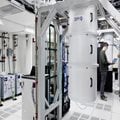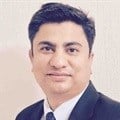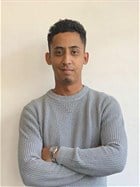#YouthMatters: IBM's Amira Abbas on quantum computing and AI

Her work at IBM Research Africa is about tackling what we might have seen as previously unsolvable problems and exploring capabilities and use cases of quantum on the continent.
Here, Abbas shares more about herself, her achievements, and what made her choose to focus on quantum computing.
What does your role as a research scientist for IBM entail?
Abbas: I feel extremely fortunate because I think I have a super cool role that combines everything I love doing. I’m currently a PhD student and my research is directly aligned to the research I do at IBM. In other words, researching for my PhD is my job.
Currently, I spend most of my time trying to figure out how quantum computers can help make artificial intelligence (AI) better. Quantum computers are often viewed as supercomputers that can outperform the computers we use today. But, it’s actually quite hard to figure out where quantum computers can help us, especially in AI.
I work with the IBM team in Zurich, Switzerland to try and understand this particular problem. I also work with the team in South Africa to teach more people in Africa about quantum computing. I love this balance of research and community work in my role because it requires very different skills and stimulates me in different ways.
You first worked in the finance industry, so what prompted you to study physics and get a job in the field?
Abbas: I grew up in a city called Durban on the east coast of South Africa. I always loved mathematics and used to get really excited as a kid when I saw crazy equations in movies. I would think to myself “I wish I could understand those things and do stuff like that”. This curiosity and relish to understand mathematics lead me to study actuarial science, which is notoriously heavy on mathematics and statistics.
I then went to work in asset management in Johannesburg for a few years. This was a great learning experience, but I couldn’t shake the feeling that something was missing from my life.
I tried to develop my skills further and eventually came across the world of quantum physics on YouTube. I immediately fell in love with it and realised what was missing from my life – the study of something that truly interested me.
Soon after this discovery, I left the financial industry and went back to study a masters in physics specialising in quantum computing. I am now doing my PhD in quantum machine learning and couldn’t be happier.
What excites you the most about quantum computing?
Abbas: I think what excites me most about quantum computing is all the unknowns and things we still have to discover. As a researcher, it’s a dream to work in a field with so many open questions – like how can quantum help AI? How can quantum help Africa and Africa-specific problems? Are quantum techniques even helpful and beneficial to us?
Additionally, there are lots of low-hanging fruit because the field of quantum computing is relatively young and so lots of discoveries are inevitable.
The field itself is also so broad and has attracted a very interesting and diverse community. This makes quantum even more enjoyable - being in a space with cool people and getting to explore fascinating things.
What goals and aspirations do you have for yourself?
Abbas: I would love to continue to produce high calibre research output in quantum computing.
I want to inspire others to see that it doesn’t matter where you’re from, what university you are at or what your background is – if you believe you can do something meaningful - even in a field as crazy sounding as quantum computing - then you can. It just takes hard work and persistence. So, I just want to keep at it and progress my research career by producing interesting work in the field of quantum computing and AI.
What achievements have you had so far?
Abbas: In terms of achievements, I think it’s pretty cool that I’m the first African to have received Google’s PhD Fellowship award for the category of quantum computing.
I have also placed first at global quantum computing hackathon events, such as the Qiskit Europe Hackathon in 2019 – Zurich and the Xanadu Quantum Hackathon in Toronto 2019.
Recently, I was the lead author on a quantum machine learning paper that made the cover of a Nature Research journal.
Otherwise, I have also received multiple scholarship awards and invited speaker requests to numerous quantum and women in science, technology, engineering, and mathematics events.
Take us through a day in the life of Amira Abbas
Abbas: My life in a nutshell: Coffee, research, reading, eating and somehow managing to sleep.
My family often say that I work a bit more than the average person, but when you’re working on something you’re passionate about, it never feels like work and it never feels like enough.
But on weekends, I try to get out into nature as much as possible. Living in South Africa, I am privileged to be able to experience such wonderful outdoor activities and I love hiking.
Comment on the importance of science and technology for the current youth and future youth
Abbas: I always say that science and technology is a lot more like art than people realise. It’s crucial to grasp for critical thinking, but you have to find what works for you, and it’s important as a young person to keep in mind that science and technology are extremely broad – just because you don’t understand one thing, doesn’t mean you won’t understand everything.
It’s also important for our youth to think about what the future holds, for any country, industry or profession and just how advancements in science and technology will affect that.
If we become more aware of the advantages and limitations of science and tech, then we can start to think about how to incorporate these future advancements in our daily lives, and perhaps harness these advantages to improve our lives. As a young individual, the first step is to educate yourself and stay curious and open to new concepts and ideas.
Luckily we live in a time where we can have access to high-quality research and ideas through our phones. This is how I came across quantum computing which, for example, has the potential to speed up computations used across finance, logistics, healthcare, and more.
We need to foster our skills locally so that our research can contribute to cutting-edge work and allow us to be ahead of the curve, instead of mere consumers of advanced tech/science.
What words of encouragement do you have for the youth?
Abbas: It’s really easy to develop a mental 'block' against science and technology. Sometimes people become afraid of maths for example if they don’t understand it in high school. This was similar to my experience with physics, in fact, physics was my lowest mark in school because I never really understood it. Now I’m doing a PhD in physics which I would have thought impossible. The key is to view science and technology as art and find your niche in this very broad space.
As for advice, I strongly believe that all it takes to achieve your goals is consistent hard work and a balanced lifestyle. If you’re still figuring out what your passion is, or feeling as if something in your life is missing, keep upskilling yourself and try to read more about things you normally wouldn’t. Maybe one day you will come across the thing that makes you tick, and then hard work can be pleasurable if you’re working on something aligned to your passion.































